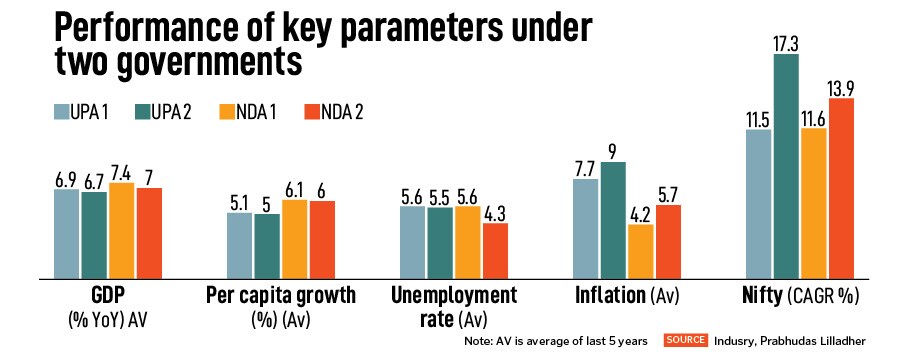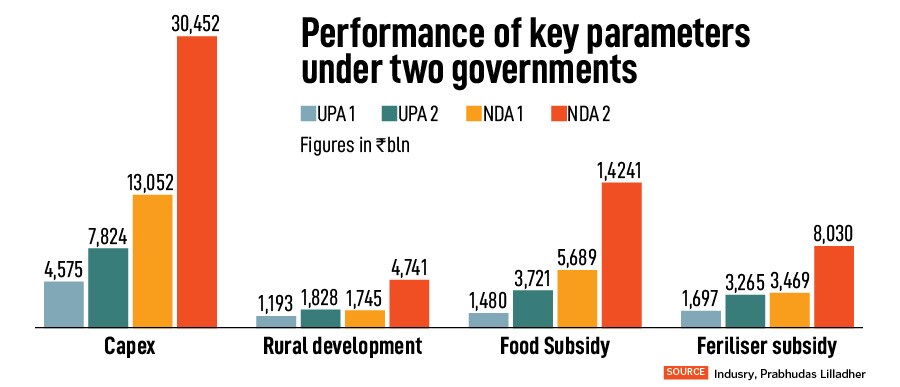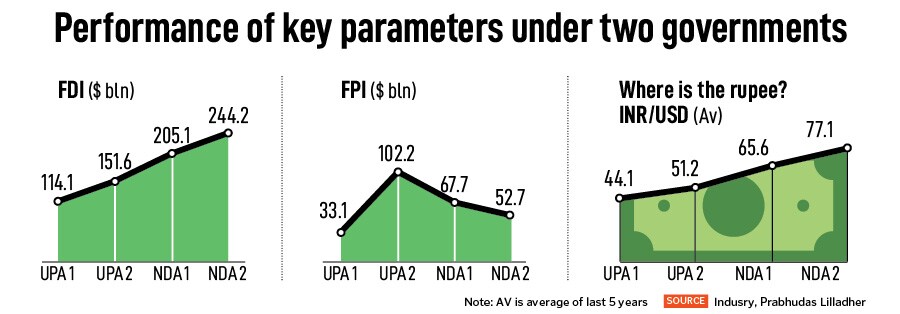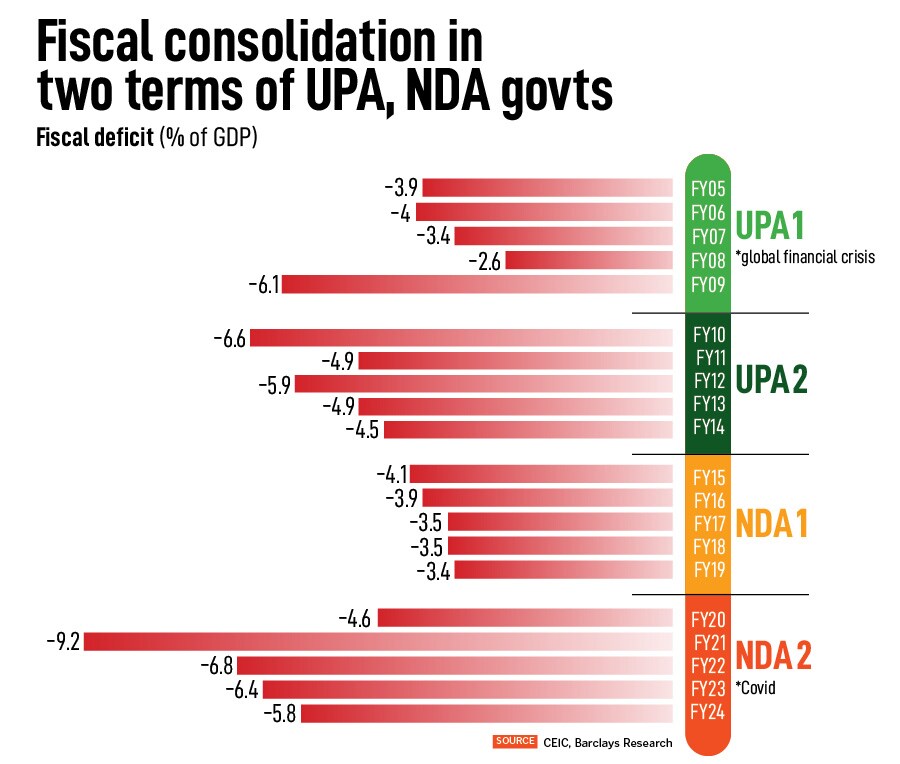However, the most important and critical factor to consider now for stock markets, corporates and the overall economy is if the polls are too optimistic about the win. Is there still room for surprise? Or is there a risk of policy complacency?
As the polls point to a larger BJP mandate implying a policy continuity, a closer look at most political parties’ manifestos indicates the risks as well. “A larger mandate for the BJP government, as suggested by opinion polls, would make it easier for the government to pass its non-economic priorities, while economic reform plans repealed earlier could also be reintroduced in more acceptable forms," says Shreya Sodhani, economist, Barclays.
Sodhani thinks a bigger winning mandate for the BJP could contribute to an environment of political and policy continuity, fostering greater confidence in the business community within the country as well as among foreign investors. She adds that the frontloading of fiscal consolidation in the interim budget in an election year highlights the government"s fiscal prudence, and this stance is unlikely to change.
However, she would not expect fiscal consolidation to be accelerated, as the government is already on track to achieve its 4.5 percent of GDP deficit target by FY26 and will likely be wary of rationalising spending further both on the capex and revex fronts.
Some of the large issues that this election is being contested on are unemployment, extension of welfare schemes, inflation, youth, women, farmers, poor & the minorities , and development. However, it is nothing new. In India, typically, these are some of the focus areas most political parties piggyback on during elections, irrespective of whichever party is in power. Accordingly, the manifestos of the major political parties in 2024 are also centred on these issues.
![]()
According to Tanvee Gupta Jain, economist, UBS, the current government has refrained from turning populist and remains on the fiscal consolidation path in the run-up to the election. She thinks political stability would likely lead to policy continuity, which could bode well for markets sentiment. While political parties are not legally obligated to fulfil their manifesto promises, the policy choices and reform narratives matter for medium-term growth and macro stability.
![]()
Manifesto: Same or different?
The BJP manifesto focuses on themes such as continuation of existing policies, India as a global manufacturing hub and adequate social support for the needy. Meanwhile, the Congress manifesto stresses on creation of jobs through a new economic policy and government-led employment, a legal guarantee for MSPs (minimum support prices) and cash transfers to the needy, education loan waiver and an increase in reservations.
According to Sanjeev Prasad, MD and co-head of Kotak Institutional Equities, election manifestos of the BJP and the Congress showcase the visions of the incumbent and the challenger, with the BJP manifesto expectedly stressing its achievements in its past two terms over 2014-24. “The Congress manifesto highlights the deficits of the past 10 years and its own achievements in its two terms over 2004-14," Prasad says.
The BJP manifesto highlights that the government has set up a high-powered committee to make ‘One Nation, One Election’ a reality and reiterated its stand to draw a Uniform Civil Code (UCC) which was first proposed in 2019. It talks about expanding existing welfare programmes, including extending a free health insurance programme to senior citizens, piped cooking gas connections, free food rations for the next five years, and free electricity to poor households, among others. It also mentions a broader government push towards supply side reforms, including higher infrastructure spending, a manufacturing push and creating employment opportunities.
In the manifesto, the BJP has mentioned it has maintained low inflation, high growth and fiscal prudence in the past decade and will continue to be on this path and guarantee that India will be the third largest economy over the next five years. “We believe the focus on policy continuity could bode well for business sentiment and the much-anticipated private corporate capex recovery," Jain says.
Key promises made by the Congress include Rs 100,000 per year to one woman in each of the poorest families under the Mahalaxmi Scheme as an unconditional cash transfer. It also includes legal guarantee to MSPs, as recommended by the Swaminathan Commission.
The Congress has a populist skew in its manifesto, according to Jain. He suggests that implementation of the populist schemes could entail taking the fiscal deficit higher to 7-8.5 percent of GDP versus 5.1 percent projected by the BJP government in their FY25 interim budget. “Fiscal expansion will hurt the macro stability narrative and could delay the private corporate capex recovery," Jain adds.
Jain explains that the Congress manifesto does not lay out the overall financial implications of the above promises and seems open-ended. “Our rough analysis suggests that implementing these poll promises would entail an additional fiscal cost of 2-3.3 percent of GDP, given no clear plan to cut back existing programmes. In our view, the arithmetic does not add up unless there is a significant economic recovery or higher taxes. However, the Congress talks about stable personal income tax rates throughout the term, limiting union cess and surcharges to 5 percent of gross tax revenue," Jain says.
The current government, in its bid to be elected for a record third time, has to challenge the narrative of fatigue and anti-incumbency after being in power for a decade.
“A comparison of the manifestos of the BJP and the Congress shows that the BJP"s poll promises are largely focussed on expanding existing welfare schemes, while the Congress"s welfare programme emphasises cash transfers and legal guarantees. Neither party has provided details of the fiscal implications of its manifesto," says Sodhani.
However, she adds that, with India"s economic outlook being quite favourable, there could be some risk of complacency. There could also be potential risk on the political front if the NDA government wins an even bigger mandate for a third-term with an enfeebled opposition. “In addition, given Modi’s popularity and political clout, ‘key man’ risk has been cited as a vulnerability of India, although, in our view, it is likely some time away from becoming a potential issue," Sodhani explains.
Stock markets: Mood check
The elections are expected to be non-events, with continuity of power likely but with so much expectation already being built in, markets won’t be immune to the results.
The opinion polls signal an average of 385-390 seats for the NDA. Some polls go as high as 411 and, given the recent performance in state elections and the results of almost all major opinion polls, 390-400 seats have become the new base.
“Profit-booking post-elections is coming anyway," says Venugopal Garre, MD, Bernstein.
With sky-high expectations having set in, a number near the 2019 value might trigger a short-term negative reaction, he believes, and adds that profit-booking in the equity market post-elections is coming anyway. The results will only serve as a trigger point for the inevitable. Garre explains, eventually, the macro story will take over, and as it stays healthy, he expects modest downsides. “We think manufacturing and capex stories will remain a key theme irrespective of the seats garnered," he adds.
But what if the BJP (or the NDA) clinch lower-than-expected 300 seats in the overall elections. Will markets turn sour?
According to Garre, a correction is inevitable, and markets that are simply looking for a reason to fall may overreact to a sentiment that may not mean much rationally. On the face of it, 300 seats will still mean the ruling party gets the absolute majority, and a construct similar to 2019, which is, in fact, a continuity of power as well as a continuity of the extent of power. Still, it will be seen as a “below consensus" result, and a reaction cannot be denied. This can eventually start the end of the current market frenzy, which has lasted for a full year.
Beyond the knee-jerk reactions, not much will change in the medium- to longer-term for stock markets and the government. “There are no major economic reforms left to implement, and it will be mostly about executing policies already formulated. Also, a major point to remember is that this is neither a change in power at the Centre nor a significant reduction in the strength of seats," Garre says.
Amnish Aggarwal, director, institutional research, Prabhudas Lilladher, feels the economy and markets have done well under both the NDA and UPA governments, given strong tailwinds of demographics. However, the NDA scores in implementing key reforms and its focus on Infra development and inclusive growth across sections and regions.
![]()
The poll dance 2024
According to Aggarwal, the NDA rule has shown superior numbers on GDP growth, inflation, CAD, unemployment and FDI, excluding the pandemic year. “Tax collection has been robust, government capex has seen multifold increase, which has kept economy growing at 7 percent despite a global slowdown. Rural development, food subsidy, domestic electricity connections, LPG etc have shown an upward trajectory under both the regimes," he adds.
Aggarwal continues that the NDA has undertaken several important reforms, including FDI in insurance, Air India privatisation, FDI in defence, reduction in corporate tax and retrospective taxation changes. Some of the reforms like exit policy, labour laws, NCLT, single-window clearances have not been fully implemented.
The upcoming election is essentially a contest between the BJP-led NDA alliance, which is seeking a third consecutive term, and a combined bloc of opposition parties called the Indian National Developmental Inclusive Alliance (I.N.D.I.A), which includes the Congress.
Fun fact
The BJP manifesto makes no mention of the Congress in its 76 pages (English version), while the Congress manifesto has 38/55 references to the BJP/NDA in its 48 pages (English version), which possibly highlights the different mindset and position of the two parties—one of an incumbent and the other of a challenger, says Kotak Institutional Equities.




